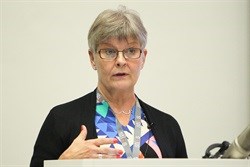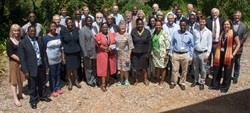Strategic directions for agricultural transformation in southern Africa were discussed at a roundtable hosted by the Stellenbosch Institute for Advanced Study (STIAS) and sponsored by the Marianne and Marcus Wallenberg Foundation in Stellenbosch on 23 and 24 February, bringing together 40 international and regional participants from various sectors.

Maud Olofsson, Minister for Enterprise and Energy from 2006 to 2011 and Deputy Prime Minister of Sweden from 2006 to 2010.
"Roundtables are the start of discussion," says Maud Olofsson (Minister for Enterprise and Energy from 2006 to 2011 and Deputy Prime Minister of Sweden from 2006 to 2010). "We know we can do things better - create more profitable agribusiness, use all our resources, knowledge, engagement and time. If we work hard, we can make a change for southern Africa and make a better life for our children and grandchildren. The two days have created an engagement and a vision of something better for the coming generation."
This initiative is linked to one of the long-term STIAS research themes concerned with sustainable agro-ecosystems and the subtheme sustainable intensification of agriculture which STIAS will promote for five years under the leadership of five international fellows.
The roundtable aimed to elucidate four outcomes including a vision for agricultural transformation; the major reforms and resources required, and, a roadmap for effective implementation.
The group proposed: "A vision of agricultural intensification at multiple scales with broad stakeholder participation for food and nutritional security in southern Africa."

Participants of the Agricultural Transformation Roundtable at STIAS in Stellenbosch. Photographer: Anton Jordaan
The participants envisaged agriculture in the region which:
- relies on the region's natural, human and financial resources to create wealth and jobs, and ensure sustainable food and nutritional security;
- allows for innovative farming models at different scales; and,
- is competitive and integrated into the regional economy through value chains.
"This implies a transformation of agriculture to respond to the challenges posed by rapid urban population growth, soil fertility decline, limited water resources, climate change, and weak infrastructure and institutions," says Eugene Terry.
Such transformation would require:
- targeted investments for human capital, innovation, infrastructure and institutional capacity enhancement;
- evidence-based and inclusive policy development, practice and evaluation;
- strategic, collaborative partnerships reflective of gender and the region's human diversity; and,
- an enabling environment to attract young women and men to invest their energy and talents into profitable, sustainable agriculture.
"Without investing in people nothing will work or change," says Lucas Gakale. "The current regional and national policy pronouncements on agricultural research and development are not matched by adequate investments on the ground."
Among many reforms and resources needed for transformation the following key ones were highlighted:
- Policy - the urgent need to formulate and harmonise policies to promote intra-regional trade and resource sharing.
- Training - the re-orientation of agricultural education to respond to challenges. More needs to be done to design programmes that improve the quality and direction of both higher-level and technical training.
- Finance - public financing is required to enhance and revitalise the degraded natural resource base (e.g. improving soil fertility and natural ecosystems) and improving access to infrastructure and technology. Southern African countries should provide more investment and be more accountable for R&D programmes that improve access to high-quality inputs and established technologies. Donor-supported programmes and projects should be regionally/nationally owned and integrated with regional/national programmes.
- Data - evidence-based policies should be based on reliable, up-to-date data.
- Stakeholder engagement - agricultural development practitioners should engage farmers and all other stakeholders involved in value-chain activities. The role of traditional leaders as stakeholders and leaders of change was also recognised.
"Past experience indicates a tendency towards planning in pilot-project mode," says Lindiwe Sibanda of the Food, Agriculture and Natural Resources Policy Analysis Network (FANRPAN).
"Policy and research must be linked to logical implementation pathways for improved food and nutritional security," adds Richard Sikora.
Regional agricultural activities have been disconnected from national ones and synchronisation is important. "If we want regional breadbaskets - we must attain the most efficient resource use in a regional context - in other words, grow things in the best places for them," says Janos Bogárdi.
"Regional co-operation is important to unpack regional best practices. This means structured networking and less duplication," says Bongiwe Njobe of ZA NAC Consulting.
The participants also emphasised the need to separate land rights and land use. "In other words, looking for innovative models where land tenure/ownership is not a hurdle to development. Where land distribution is justified, it needs to be done in such a manner that productivity, and therefore food and nutritional security, is maintained and secured," says Richard Sikora.
The results of the roundtable will be circulated amongst participants and the intention is to develop an electronic network. Future steps include think-tanks with experts on the drivers of change and development of intensification strategies that have positive impacts on food and nutrition, and on the environment and human wellbeing. A further symposium is planned as well as the publication of research results and consultations.














































